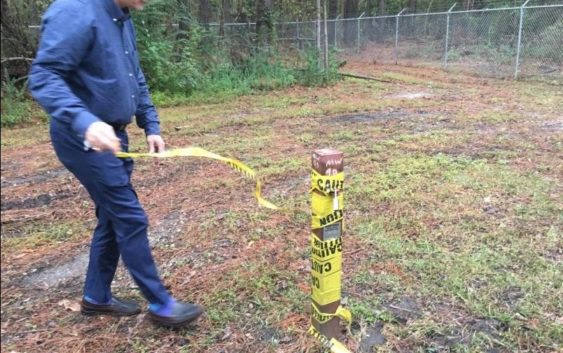- Houston Cougars take on A&M Aggies in charity exhibition game supporting Hurricane Beryl relief
- Hurricane Helene donations delivered to Avery County for Share the Warmth campaign
- Old Crow Medicine Show founder talks music, hurricane relief and this weekend's big benefit show
- IV fluid shortage caused by hurricane to last for months
- 'It financially annihilated us': Pregnant mother displaced for 2nd time after western NC floods
From GenX to Florence recovery, NC braces for shutdown impacts

The federal government shutdown began at midnight on Dec. 22 and, with Democrats and Republicans digging in, shows little sign of ending soon
WILMINGTON — As the partial federal government shutdown nears the completion of its second full week, state officials are grappling with the impacts it could have in North Carolina — particularly in terms of environmental protection and hurricane recovery.
After beginning at midnight Dec. 22, the shutdown showed no signs of coming to an end Friday, according to The Associated Press, with President Donald Trump insisting on funding for a border wall in any package to re-open the government and Democratic leadership of the House refusing any such funding.
Impacts in Southeastern North Carolina include delayed testing of water samples for GenX and other per- and polyfluoroalkyl substances (PFAS) and delays in additional funds promised for use in hurricane recovery. Officials warned, though, that impacts could become more severe should the shutdown lengthen.
In a release Thursday, N.C. Gov. Roy Cooper said, “Each day the federal government shutdown continues, it delays long-term funds needed for Hurricane Florence recovery and threatens to hold up vital services for North Carolina families. President Trump and members of Congress must work together to resolve the shutdown quickly and responsibly.”
Environmental impacts
The U.S. Environmental Protection Agency (EPA) had enough funds on hand to maintain operations for the first week of the shutdown. Now, though, most of the agency’s staff across the country have been furloughed, awaiting a funding bill.
That includes researchers at the EPA’s Atlanta laboratory who have continued to test water samples from the Cape Fear River for GenX and other per- and polyfluoroalkyl substances (PFAS).
Megan Thorpe, a spokeswoman for the N.C. Department of Environmental Quality (DEQ), said the state agency is still collecting water samples, but they are not being forwarded to the EPA lab while the shutdown is ongoing.
“Sampling has continued despite the EPA Athens lab’s current status under the federal shutdown,” Thorpe wrote. “Samples are being stored at DEQ’s Fayetteville office.”
Beyond providing access to expertise and equipment, the EPA also provides funding to DEQ, helping bolster the agency’s ranks of regulators.
Thorpe wrote, “Due to prudent management of federal funding, DEQ has estimated we have sufficient cash balances to operate federally funded programs uninterrupted for several months. Should the federal government shut down stretch beyond March, DEQ could lose nearly 75 full-time employees in multiple divisions, including Air Quality, Waste Management and Water Resources.”
Navassa Superfund site
The EPA also plays a vital role in the cleanup of Superfund and brownfield sites, including the former Kerr-McGee site in Navassa, which is a partnership between the EPA, DEQ and the Greenfield Environmental Trust Group.
Richard Elliott, the project manager for the Greenfield Environmental Trust, said the organization needs EPA approval for its budget and work plans, but is able to roll funds over into the following year. Work at the 254-acre site is in a lull, Elliott added, but what was set to begin is already underway.
“As long as the government shutdown doesn’t last, say, through January, I would say it wouldn’t have any effect on the Navassa site,” Elliott said.
Should the shutdown continue until February, though, some sampling could be delayed.
“It would just slow down the cleanup efforts,” Elliott said, “but there’s no real risk to people right now.”
Reporter Adam Wagner can be reached at 910-343-2389 or Adam.Wagner@GateHouseMedia.com.